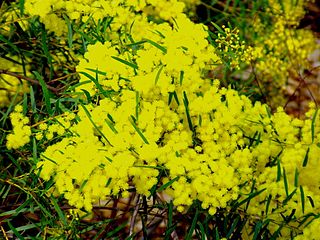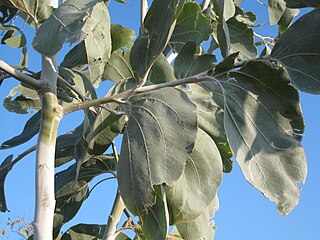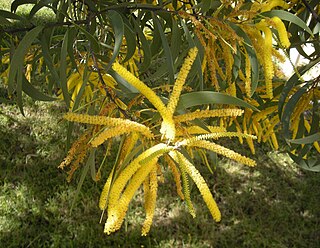
Acacia fimbriata, commonly known as the fringed wattle or Brisbane golden wattle, is a species of Acacia that is native along much of the east coast of Australia.

Acacia brownii, commonly known as heath wattle, is an erect or spreading shrub which is endemic to eastern Australia.

Acacia concurrens, commonly known as curracabah or black wattle, is a shrub native to Queensland in eastern Australia.

Acacia dunnii, commonly known as elephant ear wattle or Dunn's wattle, is a shrub or tree of the genus Acacia and the subgenus Plurinerves.

Acacia crassa, commonly known as the curracabah, is a species of Acacia native to eastern Australia.

Acacia uncinata, commonly known as gold-dust wattle or round-leaved wattle, is a shrub belonging to the genus Acacia and the subgenus Phyllodineae that is native to parts of eastern Australia.

Acacia burbidgeae, commonly known as Burbidge's wattle, is a shrub or tree belonging to the genus Acacia and the subgenus Phyllodineae that is endemic to parts of New South Wales and Queensland.

Acacia calamifolia, commonly known as wallowa or reed-leaf wattle, is a shrub or tree belonging to the genus Acacia and the subgenus Phyllodineae endemic to south eastern parts of Australia.
Acacia centrinervia, commonly known as hairy white wattle, is a shrub belonging to the genus Acacia and the subgenus Phyllodineae that is native to parts of eastern Australia.

Acacia conferta, commonly known as crowded-leaf wattle, is a shrub belonging to the genus Acacia and the subgenus Phyllodineae that is endemic to eastern Australia.

Acacia falciformis, also commonly known as broad-leaved hickory, hickory wattle, mountain hickory, large-leaf wattle, tanning wattle and black wattle, is a shrub belonging to the genus Acacia and the subgenus Phyllodineae that is endemic to eastern Australia

Acacia gladiiformis, commonly known as sword wattle or sword-leaf wattle, is a shrub belonging to the genus Acacia and the subgenus Phyllodineae that is native to parts of eastern Australia.

Acacia hamiltoniana, commonly known as Hamilton's wattle, is a shrub belonging to the genus Acacia and the subgenus Phyllodineae that is native to parts of eastern Australia.

Acacia sertiformis, commonly known as curly-leaved wattle, is a shrub belonging to the genus Acacia and the subgenus Phyllodineae native to north eastern Australia.

Acacia kydrensis, commonly known as Kydra wattle, is a shrub of the genus Acacia and the subgenus Phyllodineae that is endemic to south eastern Australia.

Acacia microcarpa, commonly known as manna wattle, is a shrub belonging to the genus Acacia and the subgenus Phyllodineae endemic to south eastern Australia.

Acacia blakei, commonly known as Blake's wattle or Wollomombi wattle, is a shrub belonging to the genus Acacia and the subgenus Juliflorae that is native to north eastern Australia.

Acacia elongata, also known as swamp wattle or slender wattle, is a shrub of the genus Acacia and the subgenus Plurinerves that is endemic to coastal areas of eastern Australia.

Acacia melvillei, commonly known as yarran, is a shrub of the genus Acacia and the subgenus Plurinerves that is endemic to south eastern Australia.

Acacia venulosa, commonly known as veiny wattle or veined wattle, is a shrub of the genus Acacia and the subgenus Plurinerves that is endemic to an area of eastern Australia.



















